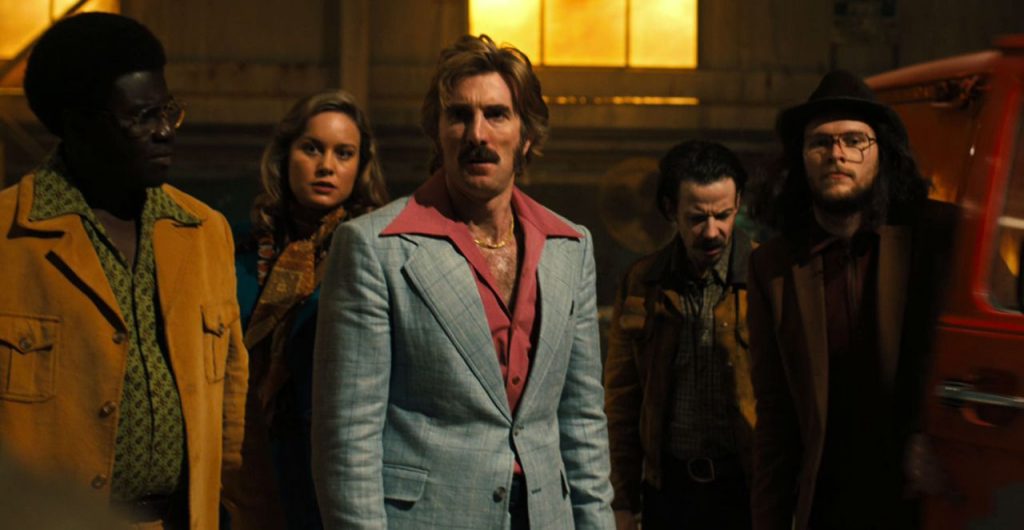The Quintessential Festival Film, by Tober Corrigan
17 Apr
It’s Monday night of the 2017 South by Southwest Festival. All of the big premieres—anticipated movies by important directors (Malick, Wright, Franco!)—have come and gone. Yet my three friends and I, the only ones currently in the general admission line, are here for the shoot-‘em-up movie boasting a cast known by face if not by name. This isn’t even a premiere in the pure sense; it’s just the stateside debut. By all the above accounts, Ben Wheatley’s film should be a severely mediocre night at the movies—a merely fine film.
Then we enter the theater. The Paramount in Austin, though lacking the prestige of the Chinese or the history of the Egyptian, still holds its own in structural integrity. People stream up and down the rows. They crowd the concession stands, chattering and abuzz with expectation. Of course they are. It’s South by Southwest. It’s the collective energy of people who have spent hundreds of dollars in passes, airfare, and lodging just to be here. It is then, only then, when the nervously energetic festival crowd becomes the context in which Free Fire is viewed, that the film can be understood as nothing more or less than an optimal good time at the movies.
Part multi-player video game campaign, part comedy of errors, Ben Wheatley’s latest is the extended fallout of a gun deal gone wrong that you likely never asked for but also never realized you wanted this badly to see. This is accomplished through the script’s breezy presentation. The opening eschews conventional introductions, revealing the people on all sides of the deal (IRA members, gun suppliers, intermediaries) with brief banter and little set up. Like the characters, we stroll into the abandoned warehouse (one of the most pertinent set pieces to a plot you’re likely to see this year) oblivious to the backstories and motivations of the others. It becomes ironic then that the two men who do happen to know each other are the ones who first perpetrate the violence in the film and prove the catalyst for the ensuing 80 minutes of mayhem.
Do not be fooled though. Talk of irony aside, the film shows little interest in being a relevant critique of society or of gun culture. The violence presented in the film is both humorous and absurd for its own sake, buoyed by a script that chooses wit to be the guiding principle of all its characters. Refreshing performances, notably in Armie Hammer’s dead-pan straight-man routine and Sharlto Copley’s hammy but delightful turn as an unhinged South African gun runner, help keep the next gun-shot wound, maiming, and fatality from feeling arbitrary or unearned. With the crackle and pop of a Mamet play, the film brings the idiosyncrasies of its characters to the surface, making comedy king and encouraging us to leave further reflections at the door. To make the hilarity more tangible and felt, costume design takes full advantage of the oft-parodied 1970s aesthetic, while a recurring John Denver cue makes for one of the film’s best punchlines.
If any deeper underpinnings can be said to exist here, it is in the pseudo-Lord of the Flies pessimism that naturally attaches itself to any survival of the fittest scenario of this sort. In the tradition of Hunger Games and Battle Royale, the film shows how an ordered, rational society can quickly devolve into chaos and Darwinian intuitions. Only, unlike the films described above, it is individual paranoia, not some contingent political system, that prod the characters on toward self-preservation. In the end, it is the out-and-out humor that differentiates Free Fire from so many of its ilk. Though things come to a definite conclusion, there is no finger wagging given the characters or the audience, no weighty pretensions to ponder post-credits, no moral to have learned after all. Instead, the journey—a most riotous, entertaining, silly journey—is what resonates.
My friends and I leave the theater more excited than we were entering it. We recount our favorite lines, our favorite action scenes, the way certain plot points didn’t make much sense and how little that mattered anyway. I try to re-capture the experience of watching each hit, near-hit, brutal kill, or otherwise, be met with cheers, whoops, and laughs. I understand myself then as having been a Roman spectator, cheering on the Gladiators of the screen to their death. It’s hard not to assume Wheatley engineered it to feel this way. During the long press tour for Manchester by the Sea, director Kenneth Lonergan persisted on calling out the Marvel machine for believing its audience cared about anything other than superheroes being cool and fighting each other. I can’t help but feel Wheatley having the same reaction to the glut of self-serious hitman and mercenary action films over the last several years.
Sure, Free Fire’s center may not hold, and it’s not one likely to grace a lot of top ten lists, but the boldness of its vacuity is something to marvel at, particularly when with hundreds of others doing the same. It is often wondered how certain films, Nate Parker’s Birth of a Nation being a most recent example, come out of festivals with glowing, universal approbation, only to receive a middling reception in subsequent wider release. My screening experience gives a possible answer: some films are just made for festivals. Consider Free Fire par excellence of that tradition and go see it with as many others as you can.




No comments yet